Reinsurance hubs
As reinsurance has joined the largest concentration movement which began in banking, the financial centers have become hubs where meetings, exchanges and decision making are taking place.
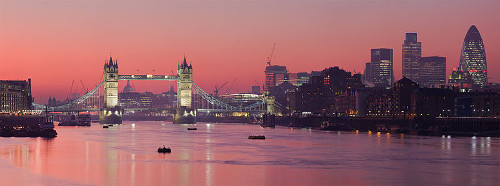 The City, London © D. Iliff, CC BY 3.0
The City, London © D. Iliff, CC BY 3.0An international financial center may be defined as the geographic location where multiple actors contributing to the proper functioning of markets meet. These gatherings take place within ecosystems that generate significant synergies.
Reinsurance hubs meet the same criteria, paving the way for significant amount of supply and demand capacity and expertise. They are usually a sort of a city in which interact reinsurers, brokers, underwriters, companies and lawyers for the purpose of processing regional or rather global reinsurance business.
The characteristics of a reinsurance hub
These privileged hubs are characterized by:
- an enabling legislative framework,
- an advantageous tax system,
- developed infrastructure,
- highly skilled workforce.
In insurance and reinsurance business, the concepts of "hub" and "market" can be confusing. It is important to note that only in rare cases may "place" and "market" be similar. The fundamental difference between the two concepts is that a hub, regardless of the amount of revenue it generates, remains a component of the market.
Development of reinsurance hubs
Traditionally located in the Western European markets such as London and Zurich, Reinsurance hubs, aided by globalization, have witnessed recovery in other parts of the world. New developments have occurred since the 90’s in places such as Singapore, Bermuda and most recently Dubai.
The relatively low insurance penetration rates offer interesting growth prospects for these reinsurance hubs where business opportunities attract both local groups and major international investors.
From these bases, reinsurers can develop diversified strategies: capacity building, improving customer relations, etc. A hub also enables other companies to achieve:
- growth; setting up companies increases revenues,
- a better geographical diversification of their portfolio,
- a better approach to local needs,
- improved service to their partners,
- skills and national expertise development.
Main reinsurance hubs
There is now at least one reinsurance hub in each geographic area (1) : London, Bermuda, Singapore, Dubai and to a lesser extent Mauritius in Africa.
London
London is the reinsurance market by excellence. It is dominated by the Lloyd's that overlooks the rest thanks to its 326 years of existence and which stands as the landmark of global reinsurance. It is the oldest institution that gathers 91 syndicates in 2013, 37% of which focusing on reinsurance.
The Lloyd's, alone, accounts for 11.3 billion USD in premiums in 2013.
Over the past five years, Lloyd's share in the global turnover has declined. From 5.1% in 2009, it stabilizes at 4.9% for three years, and then drops to 4.7% in 2013. To some analysts, the decline of the Lloyd's is caused by the relocation of a number of actors in Bermuda.
Turnover, combined ratio and technical result of the Lloyd’s: 2009-2013
in millions USD| 2009 | 2010 | 2011 | 2012 | 2013 | |
|---|---|---|---|---|---|
Turnover | 9 733 | 9 762 | 10 736 | 11 373 | 11 329 |
Global % | 5.1% | 4.9% | 4.9% | 4.9% | 4.7% |
Combined ratio | 78.4% | 90.3% | 130.6% | 91.0% | 80.5% |
Technical result | 1 983 | 913 | - 3 006 | 978 | 2 178 |
Zurich
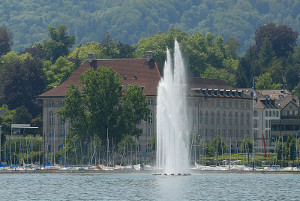 Swiss Re headquarters in Zurich © Jochen Jansen, CC BY-SA 3.0 Swiss Re headquarters in Zurich © Jochen Jansen, CC BY-SA 3.0 |
Recognized as a global financial hub, the Zurich canton is not behind in terms of reinsurance. It has become over the years a turntable of this activity in Europe. The presence of one of the global leaders in the profession is no stranger to it.
The success of Zurich as a global reinsurance hub is evident in view of all the upsides available to the city:
- position in the heart of Europe, particularly between the two European economic powerhouses such as France and Germany,
- highly-skilled staff with a powerful socio-economic and educational system,
- favorable taxation and regulations,
- the presence of an airport serving the world.
Bermuda
Within two decades, Bermuda has become one of the leading global reinsurance players, specializing in the investment of certain risks such as natural catastrophes. It was not until the late 90’s that capitals started flowing in on the island boosting it to the fourth largest reinsurance market. In 2013, the Bermudians accounted for 11.3% of global reinsurance premiums preceded only by Germany (27.3%), the Americas (15.6%), and Switzerland (15.6%).
Bermuda owes this success to their responsiveness to market needs. From 2001 and 2005, investors contributed with 26 billion USD to address not only the needs of coverage after the attacks on the World Trade Center but also to compensate the lack of capacity caused by a devastating series of hurricanes.
Currently, 30% of losses pertaining to natural catastrophes are borne by the Bermudan reinsurers. The latter disbursed 22 billion USD for the reconstruction of Florida and the Gulf of Mexico following Hurricane Katrina in 2005.
The evolution of Bermuda as an insurance and reinsurance hub was also supported by the relocation of some major players who left London to settle there.
Finally, it is worth noting that 1206 captive insurance companies, mostly American, are based in Bermuda.
Singapore
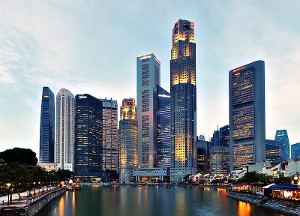 Central business district, Singapore © Erwin Soo, CC BY 2.0 Central business district, Singapore © Erwin Soo, CC BY 2.0 |
Singapore’s climb to the rank of reinsurance hub has been gradual since early 2000. Before that date, the authorities had long restricted foreign investment to simple equity shares not exceeding 49%.
The year 2000 marks a turning point in the strategy of the Singaporean government as the law restricting investment to a threshold was repealed. Therefore foreigners can own the entire share capital of local insurers. "Offshore" business witnessed an average annual growth of 13%. In 2013, direct insurance premiums reported by the market rose to 5.8 billion USD (nearly twice the local market).
Reinsurance was no exception, totalling the amount of 3.3 billion USD in 2013, growing steadily for several years.
The Singapore hub accounts for 12.38% of Pacific Asia reinsurance. Its contribution to the global market is of 1.38%.
The performance of the market is largely driven by offshore which ended the year 2013 with a turnover of 3.06 billion USD, or 52.7% of the direct local market.
In Africa
The potential of African markets allows some countries to be among the favourite destinations for international groups. This attraction is not going to boost the African reinsurance level to the Asian standard, though. In Africa, financial markets are struggling to develop, being rather regional than global.
Four hubs are aspiring to become one of the regional reinsurance centers: Mauritius Island, Nairobi (Kenya), Abidjan (Côte d'Ivoire) and Casablanca (Morocco).
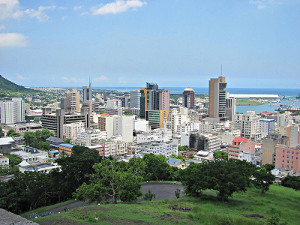 Port Louis, Mauritius © Ashok Prabhakaran, CC BY-SA 2.0 Port Louis, Mauritius © Ashok Prabhakaran, CC BY-SA 2.0 |
Mauritius is the hub of reinsurance business for Southern Africa. Endowed with an enabling legislative framework, Mauritius is to South of Africa what Bermuda is to the United States of America. The island attracts many businesses in the area.
Some of the top 10 reinsurers are already established or are about to do. It also stands as a basis for some reinsurers in the Middle East intent on some operations in Southern Africa.
To the west of the continent, Abidjan is the undisputed center of the CIMA zone countries(1) . After a decade of political turmoil during which the country has managed to keep its economy afloat, Abidjan has been experiencing a revival in reinsurance with no less than nine reinsurers having settled there in recent years.
(1) Conférence Interafricaine des Marchés de l’Assurance (Inter African conference for the insurance market) In the East, Nairobi, well served by airlines, occupies a prominent place in the region. It is from this city that regional direct insurance groups keen on expanding their business in Tanzania, Uganda and the Great Lakes region start developing. South African insurers flock in large numbers there, too.
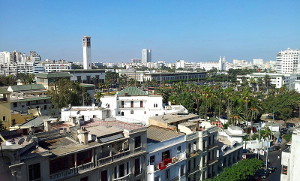 Casablanca © M. Massalitin, CC BY-SA 2.0 Casablanca © M. Massalitin, CC BY-SA 2.0 |
In Maghreb, the experience of Tunis as a reinsurance offshore ended in failure. Despite an extremely enabling legislation, the authorities have failed to make of Tunis a regional hub for reinsurance.
In North Africa, Morocco has every chance of turning into an insurance and reinsurance hub. Created two years ago, the Casablanca Finance City (CFC) operates on a model that is more or less copied on that of Middle Eastern centers.
To attract foreign partners, the authorities have drafted a specific legislative framework for insurance companies keen on settling there.
The Bahraini reinsurer Trust Re has already set up a structure that is poised to spread its wings over Africa. It was imitated by Coface (French credit insurer). However, the most promising “would-be” hub to arrive is the giant AIG, which has been granted license since January.
The Middle East
Long considered as the first reinsurance hub in the Middle East, Bahrain is suffering from multiple issues. The legalization of insurance business in Saudi Arabia pushed many companies previously installed in Bahrain to settle in the Wahhabi kingdom.
This country is, therefore, no longer destined to be the rear base of Saudi insurance. In addition, developments in Dubai (UAE) and Doha (Qatar) have rid the Bahraini market of its shine. Finally, the recurrent political turmoil eventually tarnished in a sustainable fashion the image of the financial center.
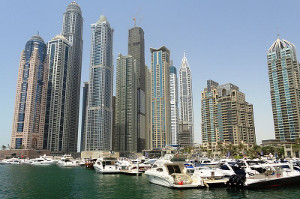 Marina, Dubai © travelourplanet.com, CC BY 2.0 Marina, Dubai © travelourplanet.com, CC BY 2.0 |
Dubai is currently standing as the principal financial center of the Middle East. Grouped within the Dubai International Financial Center (DIFC), foreign companies are developing an ongoing activity throughout the Middle East and the Indian subcontinent.
With a specially-tailored tax system for insurers, a geographical location rendering it a crossroads between East and West, the outstanding facilities and air transportation network serving the world, Dubai has the means to implement its policy. DIFC has welcomed in recent years large direct insurance groups, members of the top 10 reinsurers and the world's largest brokers.

